To view this content, you must be a member of the Rose City Review Patreon
Already a qualifying Patreon member? Refresh to access this content.
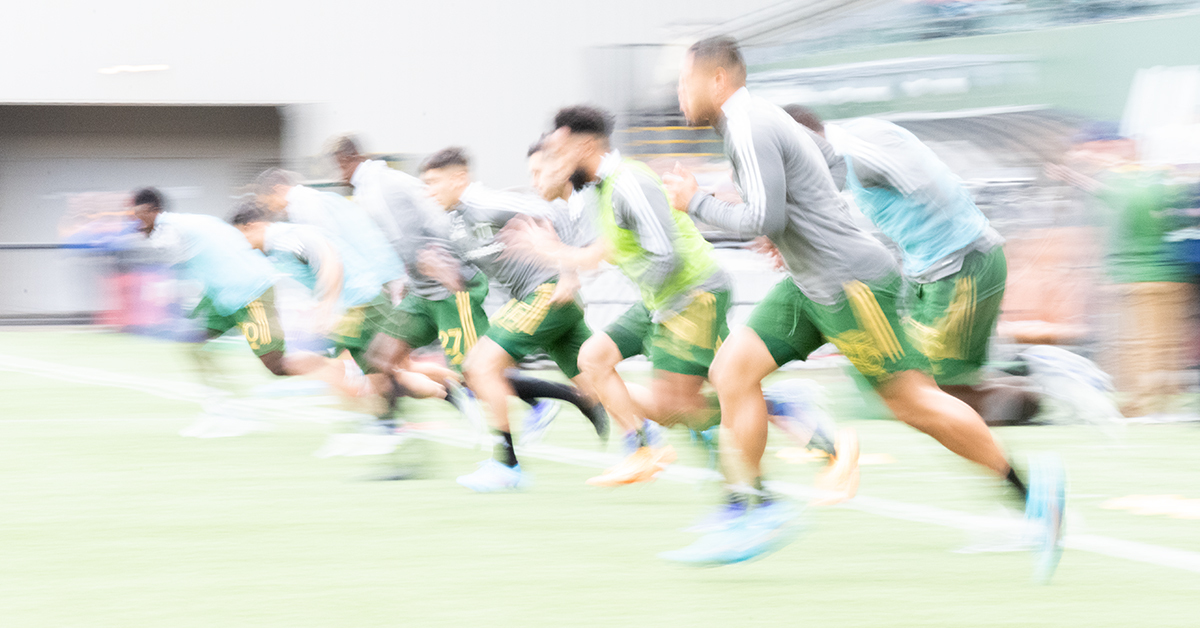
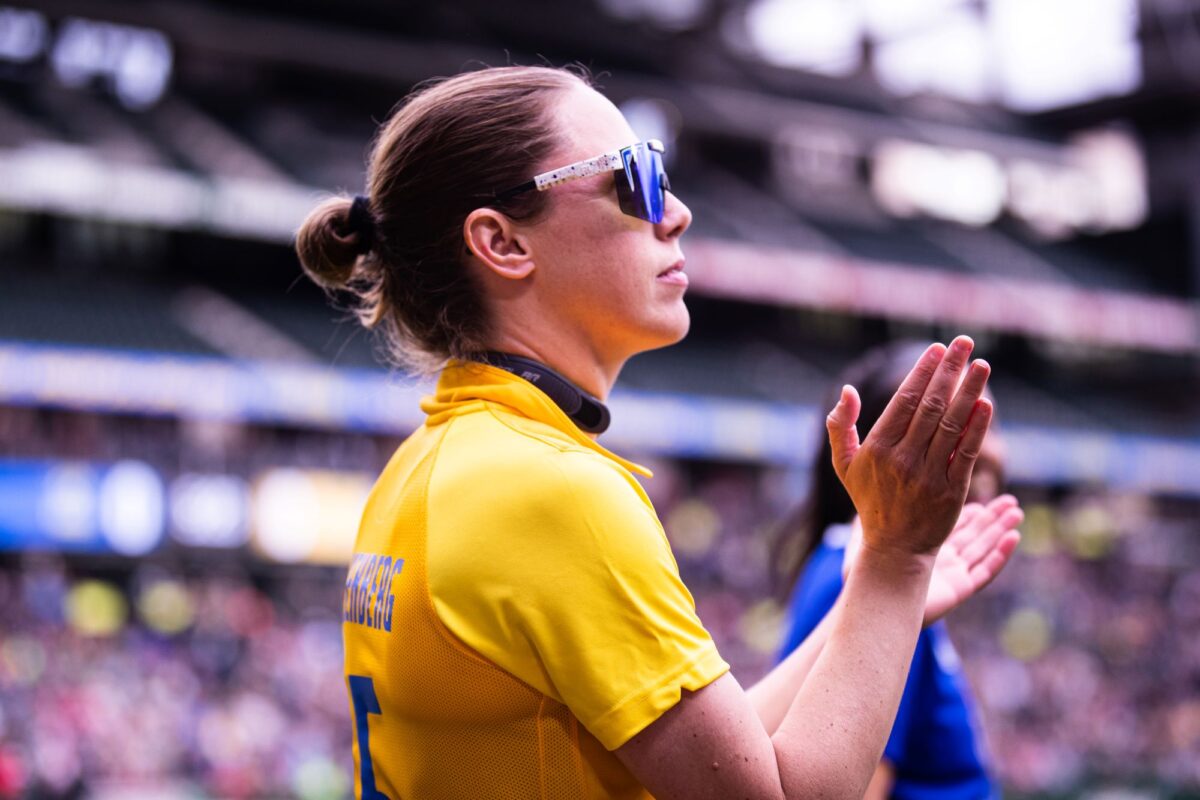
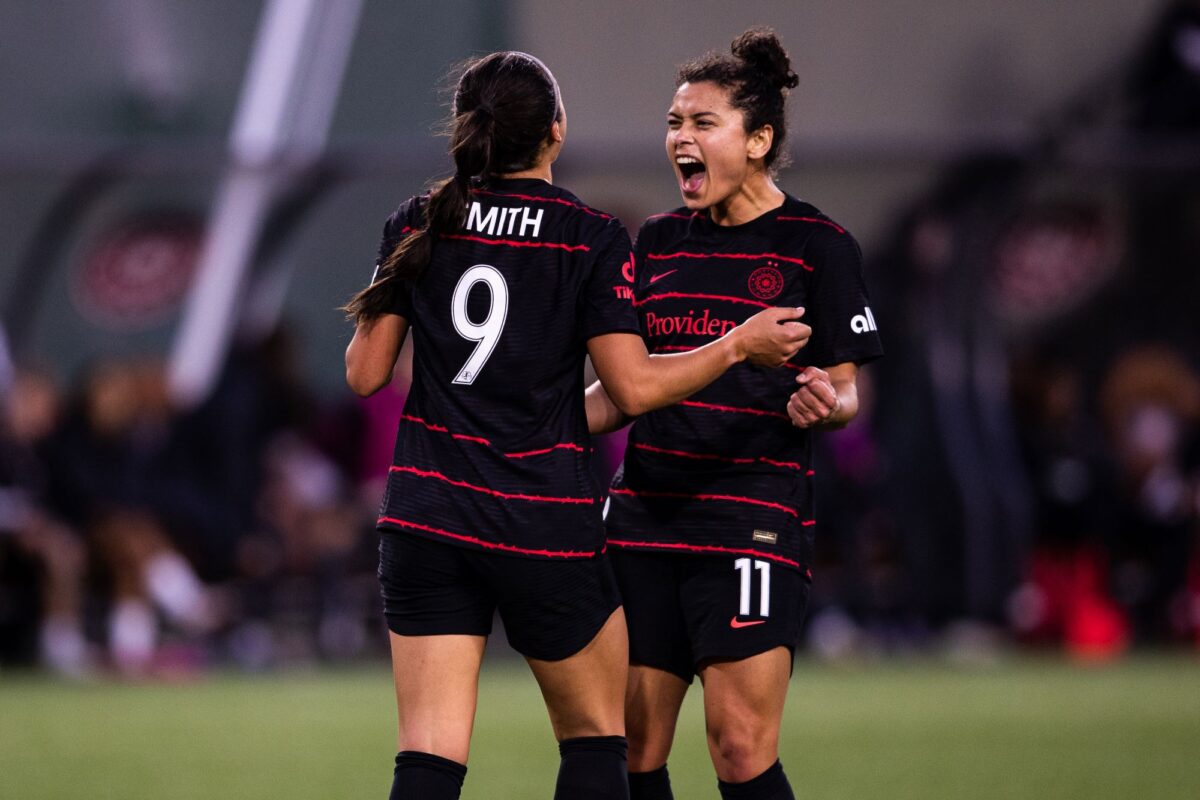
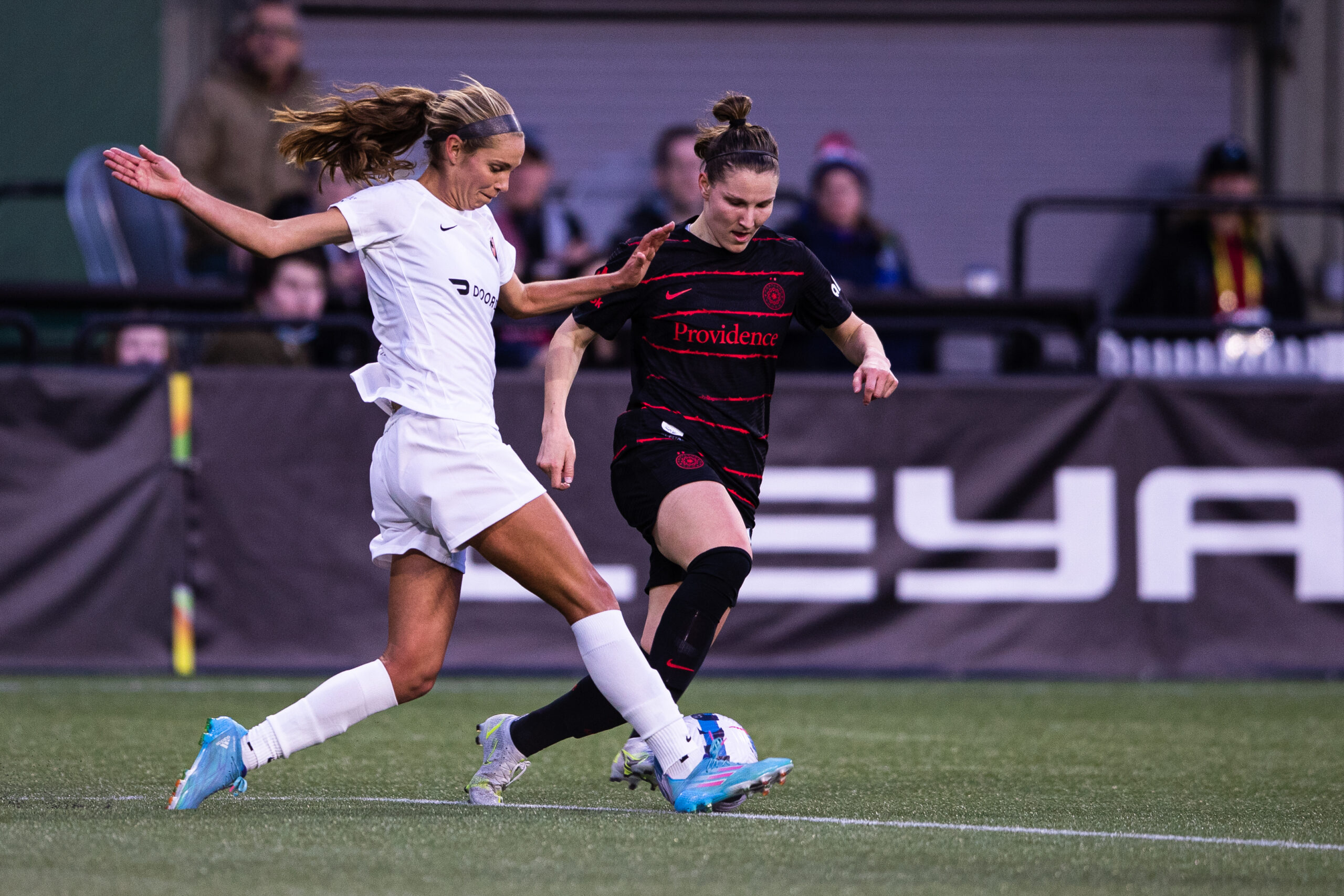
Sunday’s game against Angel City was world’s apart from the Thorns’ first game against them. After beating Los Angeles last time around, the Thorns bowed out of the Challenge Cup in the group stage with a 1-0 loss.
It’s impossible to analyze this game without talking about the five players and head coach Rhian Wilkinson’s absences due to COVID-19 protocols. Sophia Smith, Meaghan Nally, Hina Sugita, and Sam Coffey had all solidified their spots on the Thorns’ starting eleven. A preseason tournament is the ideal time to test out and formulate a consistent starting roster, especially after the turnover the Thorns experienced in the offseason. In the postgame presser, Meghan Klingenberg said that “COVID has been disrupting the world for two years, and now it’s closer to home than it has been. It’s been great to see players on the field who don’t normally start.”
As COVID-19 policies begin to relax nationwide—despite us still being in the midst of a deadly viral pandemic—NWSL teams are going to be caught in the crossfire. This is especially prevalent in the lifting of the federal mask mandate on transportation, as NWSL players do not fly chartered planes. With the country deciding that COVID-19 has ended, long lists of COVID-protocol related absences for teams could become more commonplace, no matter how tight the teams bubble is or how diligent they are in their masking.
Despite the absences, the Thorns were able to put out a great starting eleven, showcasing the depth and quality of their team. Young Olivia Moultrie got her first start of the calendar year, and Janine Beckie played a full 90 minutes on her debut game for the Thorns. Acting coach Mike Norris said after the defeat that the “challenging week” was “no excuse for the team’s poor performance.”
Last year, the theme of the Thorns was about building a strong culture. With a new head coach, it’s inevitable that the culture will shift, and a new one needs to be created. In the final game of the Challenge Cup, the Thorns were forced to test the strength of that new mentality.
During the tournament, the Thorns debuted two primary formations, a 3-5-2 and a 4-3-3. With the change of formation and change of head coach comes a change of principles. Unfortunately, it seems as though the Thorns have lost their way in recent games. The second half of the game against San Diego and all 90 minutes of play against Angel City felt uninspired and lacked urgency. The Thorns were unable to score in those 135 minutes and allowed three goals.
With eight shots total against Lost Angeles, three of which were on target, the Thorns didn’t look nearly as threatening as they normally do.
At no point after Angel City scored their penalty kick did I believe that the Thorns were going to score an equalizer. The midfield was nonexistent, and the forwards were not making the necessary runs in the box when the ball was crossed. The game was a must-win if the team wanted to move onto the semi-finals of the Challenge Cup and defend their title, yet it felt as though there were no stakes. Going down in the first half of a must-win game needed to turn on a fire for the Thorns, but it didn’t. Like Kling said postgame, “the team got away from their principles.”
While the league itself is making the Challenge Cup seem more like a joke with each announcement (Reign having to host their semi-final game at Segra Field, anyone?), the Thorns needed to use the tournament to try and gain chemistry, especially between pairings. Unfortunately, they ended the tournament poorly.
Still, it’s important to remember the extenuating circumstances. The stress of playing sports in the middle of a (still ongoing) global pandemic is hard enough when there aren’t national or league-wide safety procedures in place to help protect players and staff. Emotions are high, and it’s important to remember that the athletes on the field are people. The Thorns didn’t play with intensity or drive like they normally do, but they are still the Portland Thorns, and there is always another game for them to play.
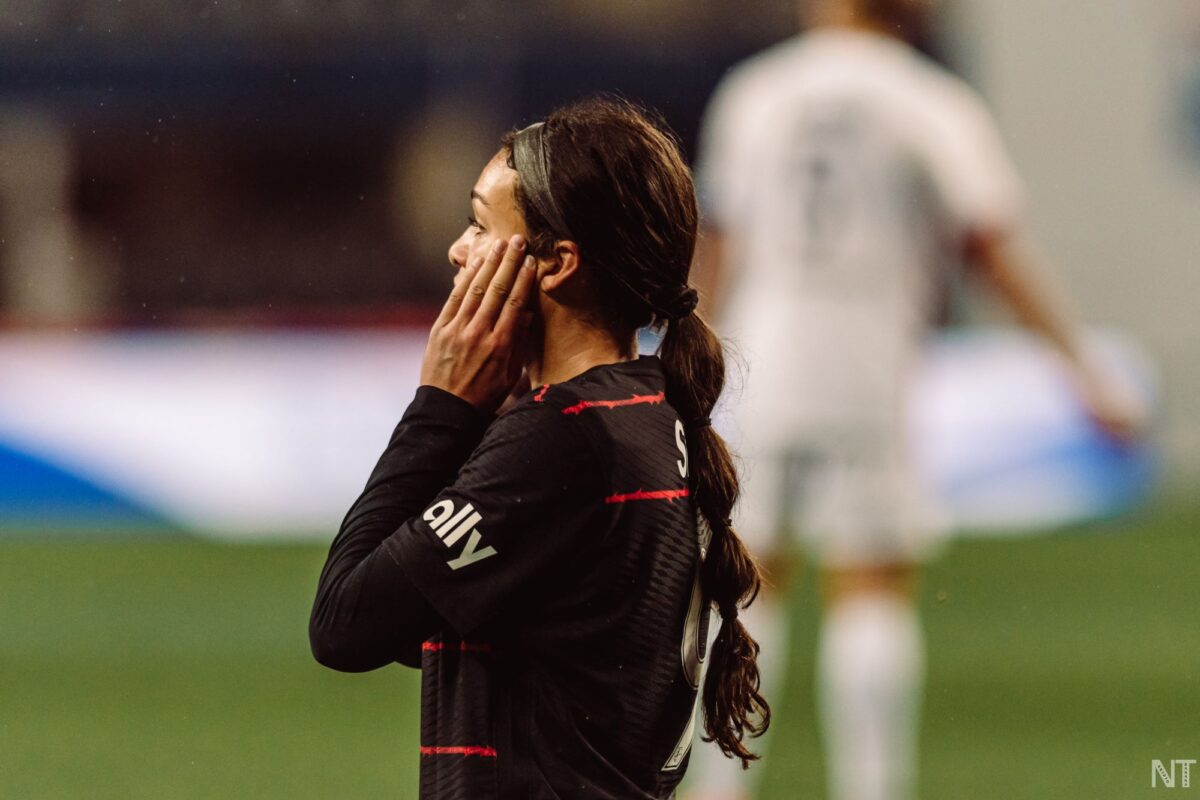
The Thorns earned a 3-2 win against the San Diego Wave on Sunday, knocking the Wave out of the running for the Challenge Cup semifinals with a strong first half. Still, Portland’s second half left room for improvement.
For the first time this year, the Thorns played a 4-3-3 formation, with Meghan Klingenberg, Kelli Hubly, Emily Menges, and Meaghan Nally spread across the defense and Sophia Smith, Christine Sinclair, and Morgan Weaver sitting as the front three.
Head coach Rhian Wilkinson said after the game that the Thorns are using the Challenge Cup to gradually add in different tactics that she wants the team to use throughout the regular season. “To have two weeks without a game when the internationals went, I felt like it was the right time to to deliver a new structure,” Wilkinson said.
The formation meant the Thorns didn’t have as many numbers wide, and, unsurprisingly, they played more through the middle as a result. We can see that through the average player positions between the Thorns’ last game against OL Reign—where they played a 5-3-2—and Sunday’s game against the Wave, where players are more clustered in the center of the park:


“What I’ve loved is I think you can see this team buys in,” Wilkinson said of the new formation. “They trust one another.”
That trust was evident in the first half. The Thorns dominated those 45 minutes, winning balls, controlling the midfield, and getting chance after chance off. They ended the half with 16 shots to San Diego’s four and a 3-0 lead to show for it.
Smith opened the scoring in the fourth minute when she got on the end of an on-the-ground cross from Weaver, touched the ball just around her defender, and sent a shot into the far corner that San Diego’s Carly Telford wasn’t able to react to in time.
Portland struck again in the 21st and 41st minutes, as Hina Sugita tallied her first two goals for the team. In both cases, she exposed San Diego’s defensive marking, getting on the ends of rebounds to hit the ball into the back of the net. And it doesn’t hurt that they were both fun to watch:
Hina Sugita scores her first NWSL goal to put us up by 2. Congrats Hina!!! #BAONPDX pic.twitter.com/T1ZPZxTp43
— Portland Thorns FC (@ThornsFC) April 17, 2022
Thoughts anyone? 🧐🤔 #BAONPDX pic.twitter.com/DzvUlisCqx
— Portland Thorns FC (@ThornsFC) April 18, 2022
“If you’ve watched her the last few games, this is what she’s been doing,” Wilkinson said of Sugita. “I think she’s just gaining in confidence every game and did very well today.”
But if the first half was a breeze for the Thorns, the second half was anything but. San Diego brought in rookie Kelsey Turnbow after the break, and she immediately went to work terrorizing Portland’s defense. In just the first minute, she played a perfect ball into Alex Morgan, whose shot left Bella Bixby scrambling to her feet as Bella Briede picked up the ball at the top of the six and buried her shot.
The game’s momentum shifted in favor of the Wave after that, with San Diego growing into the midfield and forcing the Thorns into a lot of last-ditch defending. San Diego got of 13 shots in those final 45 minutes, while Portland managed only two. “Our talk halftime was keep the standard up,” Sam Coffey said after the match, “and we didn’t do that.”
Taylor Kornieck further cut into the Thorns’s lead coming off the bench in the 67th minute, scoring a header off a Wave corner kick by virtue of her positioning and being tall.
Although the Thorns were able to hold onto the win, it was a gritty end to a dominant start. “Something Rhian really emphasizes for our group is winning the right way,” Coffey said. “I don’t think we we did that to the best of our ability.
“That doesn’t mean that we hang our heads low or we’re all disappointed, but it’s fuel for the fire,” she said. “I think that’s a good thing for this group, especially with another game just around the corner.”
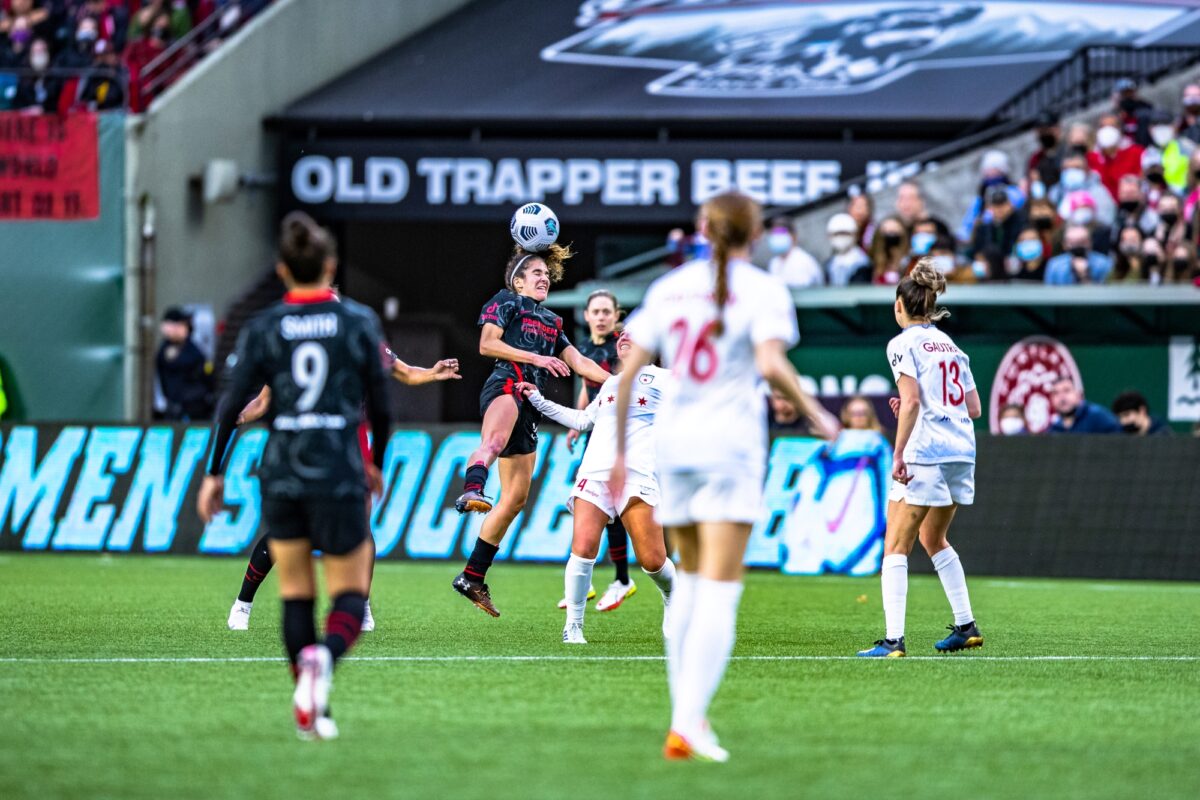
Wednesday night’s inaugural game against Angel City FC saw several Thorns professional debuts in a decisive 3-0 victory. The Thorns dominated on every stat except possession and played a high-press game, particularly in the second half. Portland ended the night with 14 shots—seven of which were on target—and 13 crosses, all of which were double what Los Angeles was able to produce. Despite being early into preseason with several key players out on injury or limited minutes, the Thorns are looking strong and cohesive, and the numbers reflect that.
I’ve attended all of the Thorns games thus far, this was by far the most fun. Nearly 10,000 people attended a mid-week game, which brought a lively atmosphere into the Park. The purple smoke for domestic violence was sent off and the “YOU KNEW” banner flew, reminding everyone about the horrific actions of the front office. On the field, however, the team seemed as though they were having fun and enjoying themselves and the freedom they are given on the field, which is amplified by the crowd.
Three different players scored on Wednesday—including Yazmeen Ryan, who tallied her first professional goal. And, because I think scoring goals is really fun, I am going to attempt to break down what went well to allow the Thorns their first multiple-goal game of the 2022 Challenge Cup.
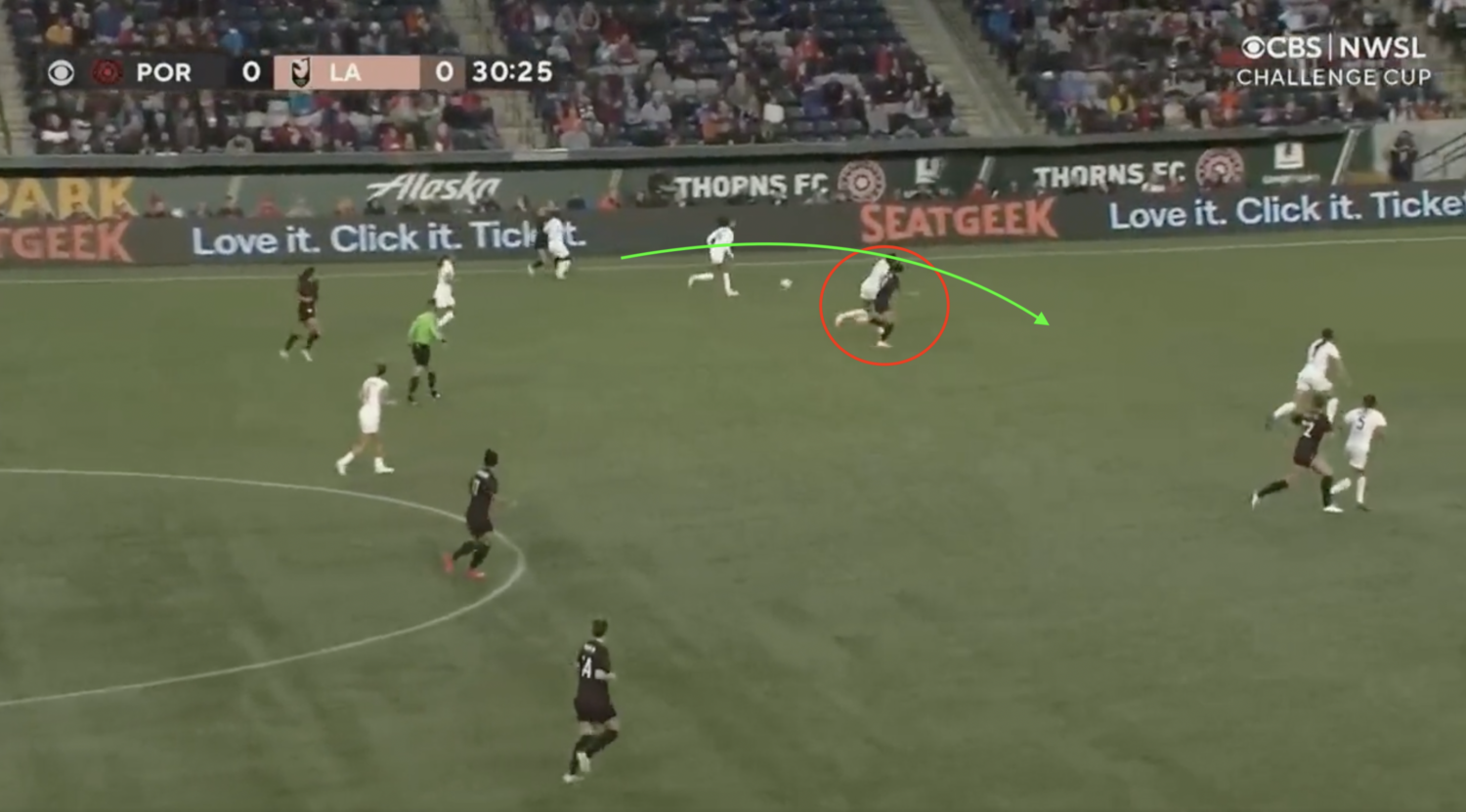
In the screen cap above, Sophia Smith is the red circle, and the green arrow is the trajectory of the ball played in by Natalie Beckman. Smith gets on the inside of her defender and has the pace to outrun her. If Beckman plays the ball too far ahead, or too hard, there are two Angel City defenders who are ahead of Smith to reach it first. With the quick movement of her hips and feet, Smith is able to fake out the defender on her shoulder and sit her down. From there, she has a clear path to goal.
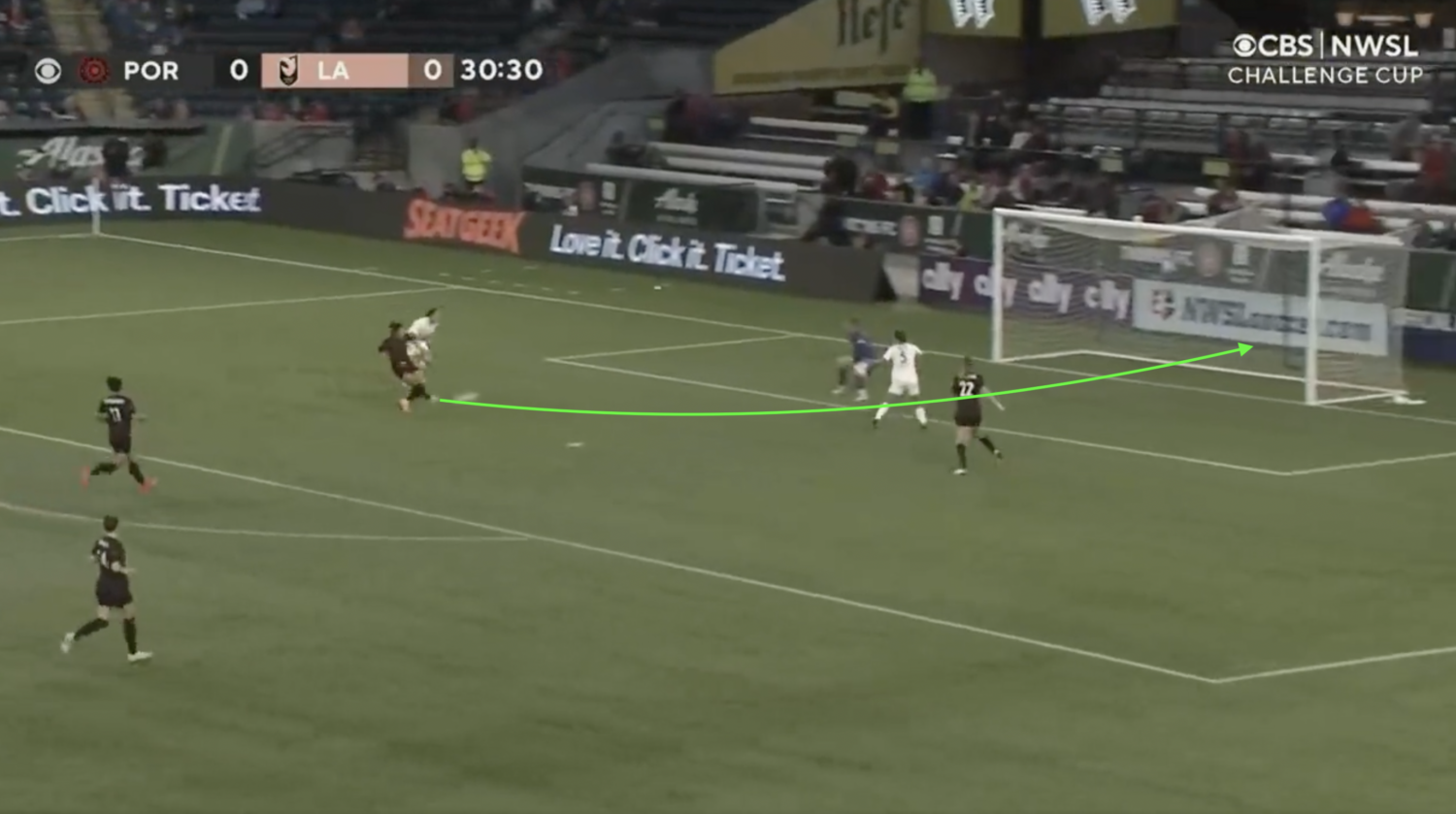
When Smith reaches the inside of the penalty box, she is able to put the ball on her preferred right foot and deftly place it in the lower left corner of the net, out of reach of the Angel City goalkeeper. Postgame, Smith talked about how her shooting accuracy has been something she has developed through repetition, largely alongside Morgan Weaver. Seeing the fruits of training pay off in a game is very fulfilling.
Ryan scored the second goal off a rebounded bullet shot by Natalia Kuikka.
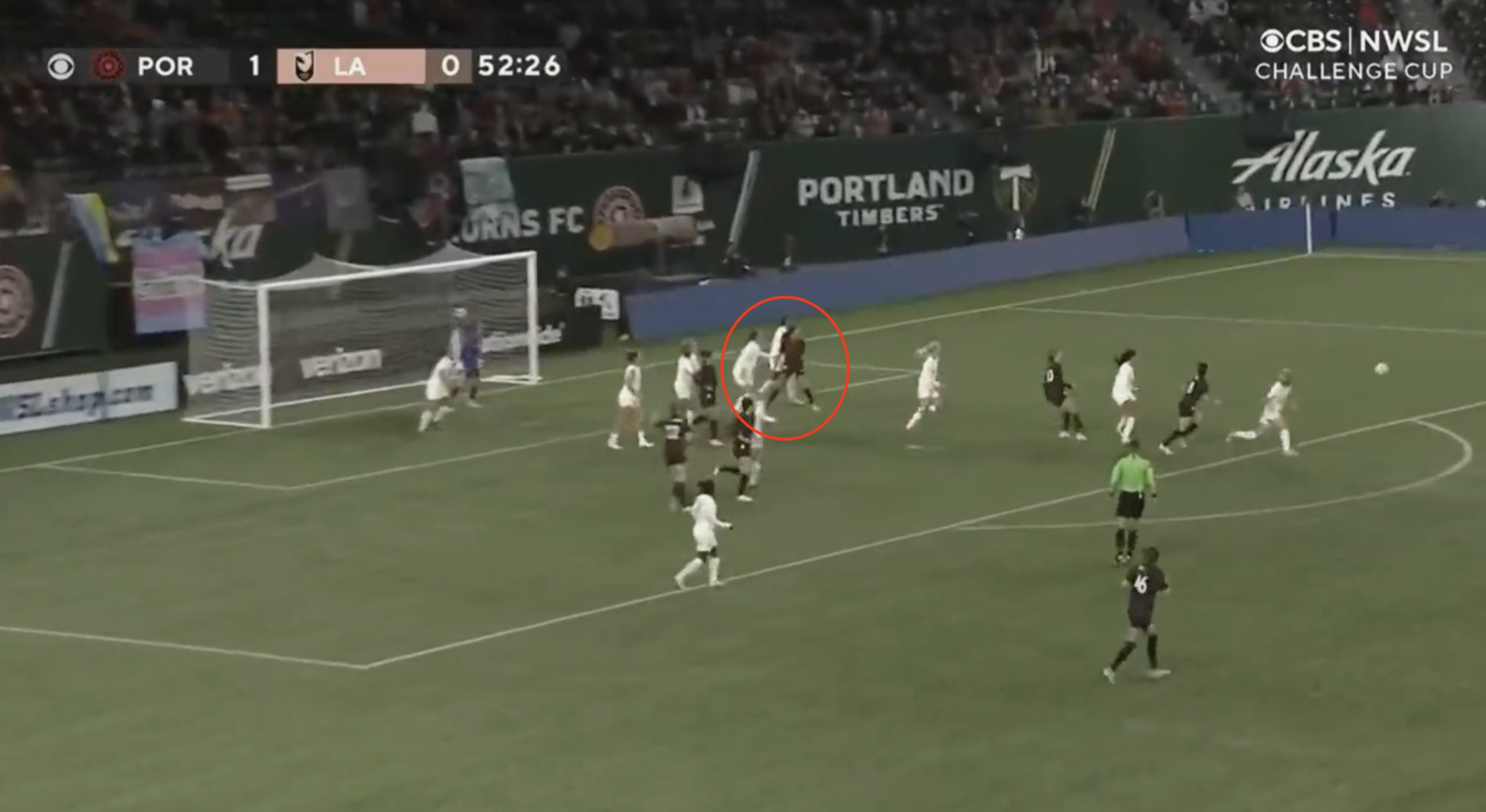
Ryan, circled in red, is watching Kuikka set up her shot. Once it goes off, she is able to turn on the inside of her defender and be prepared for the rebound. Her positioning here is what allows her to easily deflect the path of the ball into the back of the net. All of the Thorns were heads up during this play, with Kelli Hubly even with Ryan and ready to receive the ball if the initial shot didn’t make it.
Weaver recorded her first Thorns goal of 2022 in the final 15 minutes of the game.
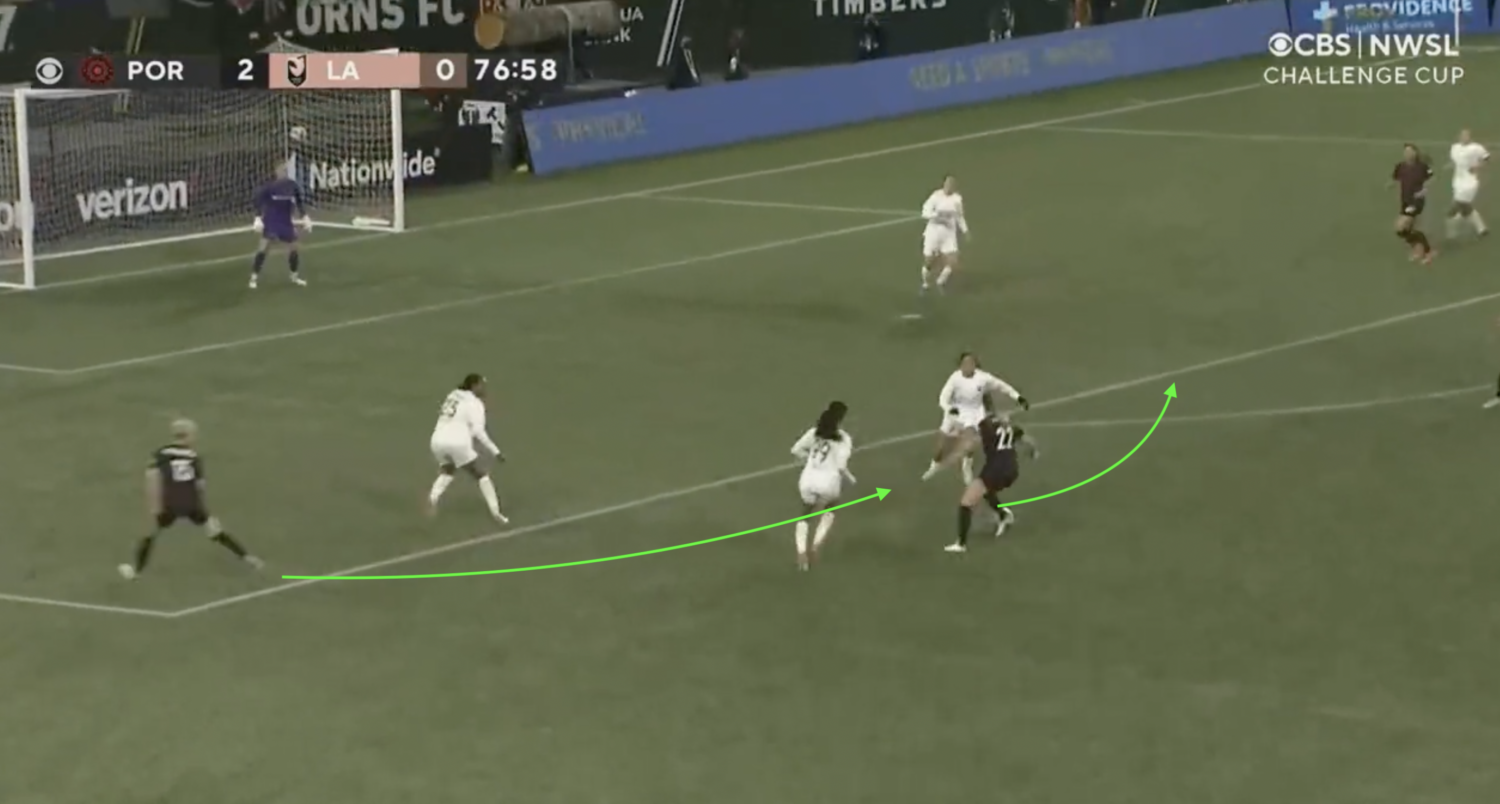
Madison Pogarch, coming back from injury and earning her first minutes of the year, was playing as a winger (finally one step closer to playing as a forward) and intercepted the ball high up the pitch. She controlled it, and passed it to Weaver at the top of the box. Weaver was able to swing the ball across her body into the open space in the arc. Both the defenders were crashing onto her left side, and by simply changing the direction, she was able to open up the entire goal. She then sent an absolute screamer curling into the side netting. Much like Smith, her goal is one that she has been repeatedly working on in practices and on her own time. As the season progresses, we can only hope that she will be prolific in front of goal.
Challenge Cup group play is halfway over, and the Thorns remain undefeated. As they go against each team in the West once more, the Thorns’ depth will be tested. But, if they keep finding the space in front of goal as they did against Angel City, they should end up with plenty of points from these next three games.
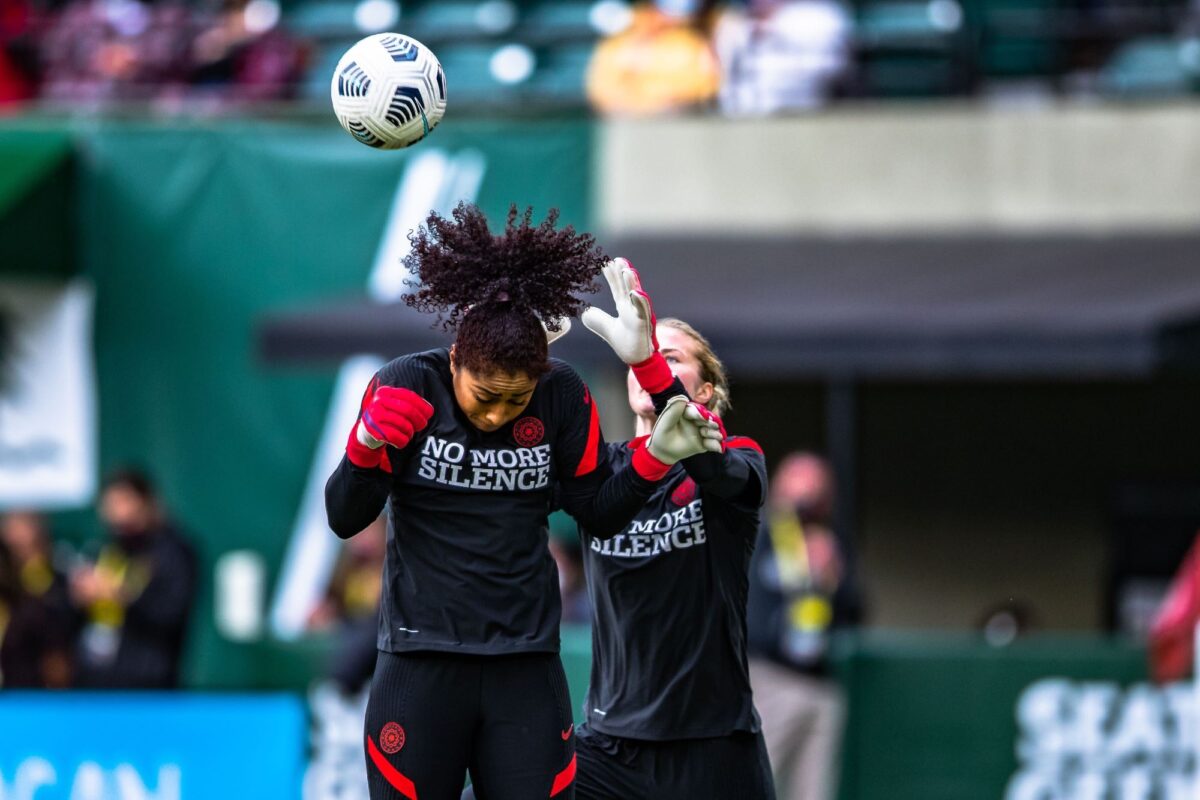
The Thorns look very different than when they stepped off the field in 2021, and two games into a preseason tournament, they are still finding their footing. Without being too critical of the team, there are plenty of bright spots to take away from the inaugural Thorns versus San Diego Wave game.
Saturday night’s game marked the professional Thorns debuts of Abby Smith and Natalie Beckman. Both players appeared in the preseason games and showed new head coach Rhian Wilkinson that they had valuable skills. Although Beckman only played about 10 minutes coming in for Klingenberg, she looked confident on the wing as part of the Thorns’ five-back and should be an exciting prospect in the games to come. Smith has plenty of NWSL experience, most recently for the Kansas City Current, but had yet to make an appearance for the Thorns since signing mid-season in 2021.
In her inaugural game, Smith registered seven saves and a clean sheet, making her the fourth Thorns keeper to record a clean sheet in a Challenge Cup match. The decision to start Smith over Bella Bixby, Thorns No. 1, was a collaborative one between head goalkeeper coach Nadine Angerer, Bixby, and Smith. Head coach Rhian Wilkinson said post-game that it was Bixby’s suggestion to have Smith play so that Smith has the minutes and confidence to fill in when Bixby is unavailable. Smith also spoke highly of the Goalkeeper Union in Portland and how all keepers push one another and inspire greatness. With such a solid culture in goal, any of the Portland keepers should be able to control the backline.
Saying that Sophia Smith is good at soccer is probably the understatement of the year. Her technical skill and ability to get in behind the backline has already proven to be crucial to the Thorns’s attacking strategies. Sinking three out of three shots on target, Smith is lethal in front of goal. However, in the game against the Wave, Smith showed that she is more than just a pacey striker. In the run up to the Thorns’s lone goal, Smith was able to draw out three San Diego defenders to surround her, leaving both Natalia Kuikka and Christine Sinclair with plenty of space on the wings to send a ball in that Smith hit one-time deftly around Sheridan.
Post-game, Wilkinson had high praise for Smith. She cited that Smith not only has a high ceiling that she delivers on, but that she is able to quickly implement feedback. One thing that Smith and Wilkinson are working on is “when to go in behind defense on transition and when to hold back to create different types of scoring opportunities.” With the combination of skills she possesses, it is a no-brainer that Smith will be a crucial member of the Thorns this year.
Sam Coffey, Yazmeen Ryan, and Meaghan Nally all got the start on Saturday. With Becky Sauerbrunn out after undergoing surgery to repair her meniscus, Nally has been able to slide into a starting role on the backline. She didn’t look out of place in the slightest alongside veteran defenders Emily Menges and Kelli Hubly, registering the highest number of touches and completed passes of the three.
Ryan and Coffey, alongside Hina Sugita, are working to rebuild the midfield that the Thorns lost in the offseason. Together, the two young players in their first full season with the Thorns have already impressed. As the holding midfielder No. 6, Coffey had nearly an 80% passing completion rate. She was able to exploit the wide open spaces left by the non-existent Wave midfield, and looked as though she controlled the field. As she gains more experience and confidence on the field, she will be a real force to be reckoned with. Finally, Ryan also worked hard in the midfield, completing several successful dribbles to bring the ball into the final third, playing in Smith. As both Sophia Smith and Ryan get more time together and their partnership solidifies, they should be a lethal duo on the left.
The Thorns go again tonight at home for their inaugural match against Angel City FC as they continue their run to secure their second Challenge Cup championship.
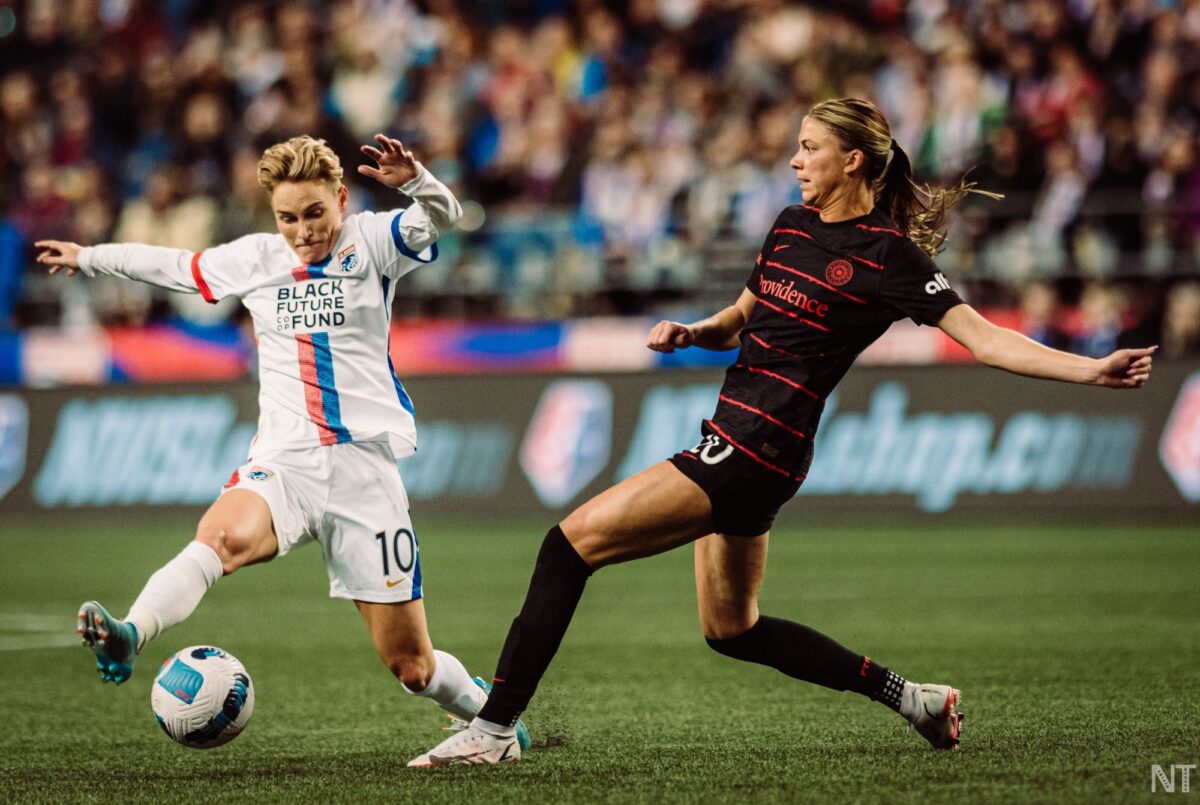
It’s Challenge Cup time again, and the Thorns opened their tournament on Friday with a 1-1 draw to OL Reign. Even with a couple missed chances, it wasn’t a bad start to Portland’s first non-preseason game of 2022—and it left us with a lot of positives for what this team can become.
The Thorns are generally a team that have high expectations for themselves—take just last year, when they set out with the goal to “win everything”—and they’ll want better than a draw. But with a new team and a new head coach and a number of key players out, I don’t think we can read the team’s performance or the game’s outcome as a bad result.
Thorns head coach Rhian Wilkinson put it best in the postgame press conference. “I thought the team put in a performance, in a lot of ways, that we can be proud of,” she said. Although she said that Portland has room to grow, and that they did miss a couple good opportunities, “they gritted out a tie, and winning teams get points on the road. I was really proud of that piece of it.”
Not only did the Thorns pick up a draw, but they did so without the likes of Crystal Dunn, Madison Pogarch, Rocky Rodríguez, and Becky Sauerbrunn.
Those absences—along with the temporary departure of Lindsay Horan and Angela Salem’s retirement—meant Friday night’s Thorns were in a very different position from last year. Instead of leaning on an internationally-experienced midfield that had at least a couple years in Portland’s system under their belt, the Thorns started relatively young midfield that hadn’t really played together before. Hina Sugita and Sam Coffey—while both clearly very talented—are new to the team, and Yazmeen Ryan played less than 400 minutes in the regular season last year.
It’s not surprising that it took the Thorns a second to settle in. In the opening minutes of the match, Portland looked happy to give the Reign time on the ball, sitting back using pressure to force OL to play out of the back.
In Sauerbrunn’s absence, the Thorns also started Meaghan Nally in defense, who had played 19 minutes for Portland in 2022. Despite a dodgy moment early on, she grew into the game and helped hold Portland to one goal against. Wilkinson called her “unflappable” after the match.
“It took us a second to get organized and communicate a little bit better,” Christine Sinclair said after the match, “but I think we figured it out pretty quickly.”
Even though it was fun to watch Portland’s midfield settle in and more effectively contain world class players like Jess Fishlock and Quinn, I’m not sure how much to read into that performance. Rodríguez, Dunn, and, presumably, Horan will be coming back into the fold as the season progresses, and I won’t be surprised if Wilkinson experiments with formations as she and the players get used to working with each other. Still, Coffey, Ryan, and Sugita all put in solid shifts on Friday, and I’m excited to see how they develop as the season progresses.
“We’re definitely up for the challenge,” Sinclair said, “and we’re only going to grow more and more each game.”
And as the Thorns grow into this new iteration of the team, they’ll still have the likes of a number of more experienced players to lean on. Sinclair, Natalia Kuikka, and Sophia Smith showed as much with the goal they worked to create against the Reign.
Sincy on the spot. #BAONPDX | #NWSLChallengeCup pic.twitter.com/sqm1d1cwHd
— Portland Thorns FC (@ThornsFC) March 19, 2022
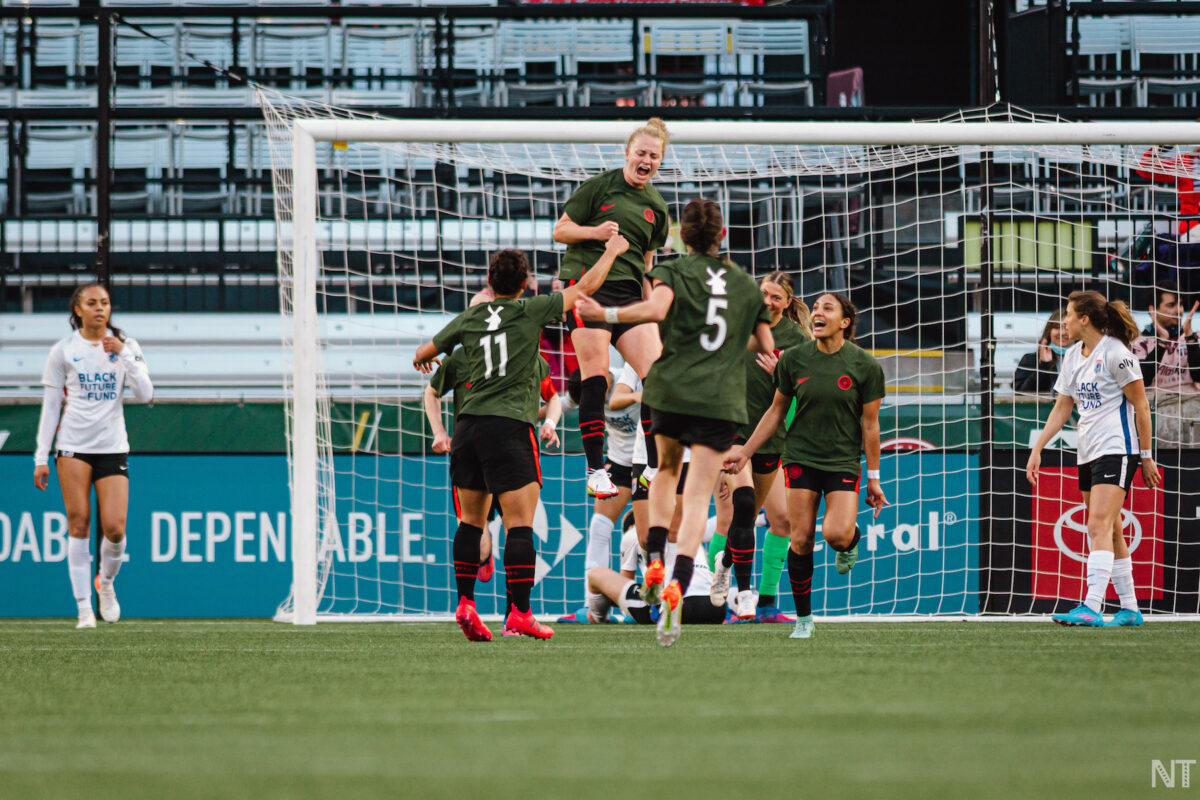
The Thorns have their first open-door match of 2022 on the books in the form of a 0–0 draw against OL “ol’ Reign” Reign. Rhian Wilkinson’s first game! The Thorns wore green! Let’s talk about it.
With Lindsey Horan gone, the Thorns have no choice but to come up with a completely new system. I’m not sure most fans are really prepared for what losing Horan means, which may be partially my fault and that of my media peers, since I don’t know that we’ve collectively emphasized enough how pivotal she was in the Mark Parsons era. So, to be clear: having Lindsey Horan is like having an extra player on the field. She’s a living cheat code. She was such a presence for the Thorns that she was almost easy to take for granted, like the sun.
It’s not that Portland never got results without her—the clashing NWSL and international schedules meant they had to do that plenty of times when she was on the roster—but I get the sense that the collective awareness of her importance was almost unconscious. Her contribution to the team wasn’t scoring worldies as much as it was that she’d show up and everything on the field would suddenly work better. The discourse when she was available wasn’t “Horan looked good today,” it was, “the Thorns looked good today.”
All this is preamble to the fact that Wilkinson is doing something very, very different with this team. The squad lined up like this:
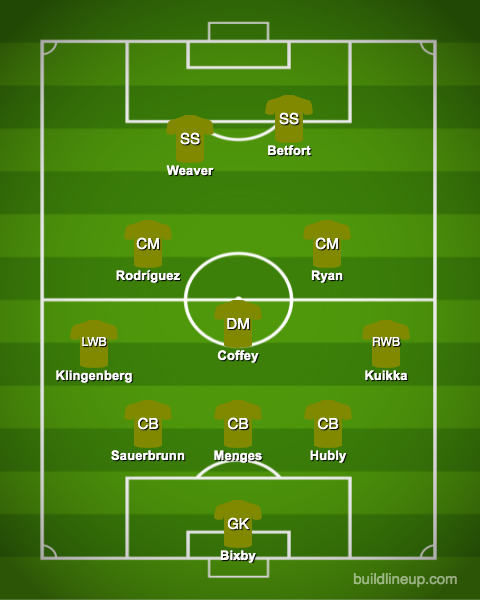
In a word, the game was unspectacular. Whenever they lost possession, the Thorns would drop straight into a neat block; Morgan Weaver and Hannah Betfort would pester a center back or two to keep things moving, but the counterpress of the Parsons days is long gone. Natalia Kuikka and, to a lesser extent, Meghan Klingenberg, played pretty defensively, spending more time cutting off Reign attacks up the wing than looking to go forward themselves. Sam Coffey sat in a sharply defined No. 6 role, using none of the creativity she displayed at Penn State. Postgame, Rhian Wilkinson had this to say about using Coffey in that role:
Sam, even when I first brought her in, her calmness on the ball—she’s got ice in her veins. She’s been like that since day one, just like, “give me the ball.”… In that way, I really believe in midfield strength and connection. And I like her at the six, I think that she really comes alive, and she connects our team. We have a number of players that can do it. But I wanted to put her in the fire really, and see how she did. And I think she gave you all a glimpse of the talent that she has.
Thorns attacks were sparse, with a handful of chances in the first 15 minutes, then another handful in the last half hour. An early goal by Betfort—a header from close range off a corner by Weaver—was waved off for a foul. Most of the chances came from exploiting the spaces left open by Seattle’s press, with Kelli Hubly and Becky Sauerbrunn both connecting directly with the forwards a few times.
Betfort is listed as a defender, but Wilkinson says she sees her as a striker, and had this to say when comparing her with the other forwards on the roster:
Morgan and Sophia Smith are pure athletes. They’re incredible with their feet, technically, as well. Hannah has also got a lot of speed… the other two have a little bit more quickness, she has pure speed. And she’s very obviously a big strong woman who holds the ball out well for us. And she’s got clean feet for someone who is sort of one of those air quotes “old-school” kind of nines, as holding the ball up, she’s got really tidy feet. And I think she likes to play in a different way, where the others pull the line back, she often comes off the front.
The Thorns haven’t had a good old-fashioned shit-kicking nine in some time, and I enjoyed watching Betfort in that role.
In the midfield, Portland often looked outmatched. They were visibly frustrated with the Reign’s press, and Rocky Rodríguez and Yazmeen Ryan struggled to get past Quinn and Jess Fishlock. They’re both excellent creative players, but with a No. 6 who isn’t tasked with contributing much to the attack, no No. 10, and two forwards who tend to stay forward more than drop back to connect play, they couldn’t build much out of the center of the field.
But what we saw last night is not Portland’s best XI. Hina Sugita got about ten minutes in the No. 8 at the end of the match, about which all I have to say is: everybody new to the NWSL has to get that initiatory “why are they like this” moment out of the way. Smith came on in the 74th minute looking sharp as hell and immediately improved the connection between the midfield and the forward line. Also, Crystal Dunn will not be pregnant forever.
The defense was last night’s strong point. Hubly, Sauerbrunn, and Emily Menges are an outstanding central trio and contained just about everything the Reign threw at them. Whatever hiccups happen with the front five as the season gets rolling, Portland will be able to lean on that defensive foundation for results.
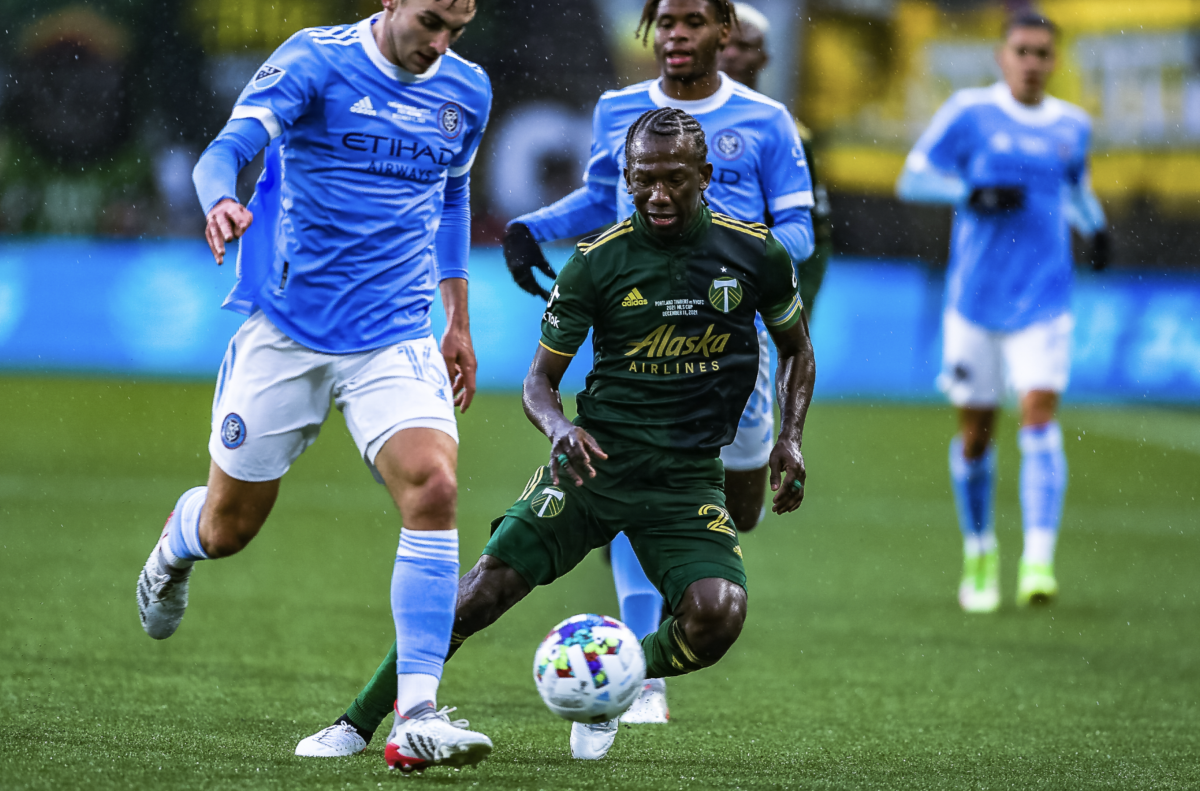
The Portland Timbers are days away from kicking off the 2022 season at home on national television against the New England Revolution.
In ordinary years, this would be cause for great excitement. This year, with the club’s leadership embroiled in controversy over its handling of the Paul Riley coercion and harassment allegations and under investigation over its handling of the Andy Polo abuse allegations, it’s decidedly different.
For many, the joy of attending Timbers matches has been complicated. For some, it’s been, at least for now, erased. The club is set to meet with the leadership of the Timbers Army for the first time since the Riley story broke on March 3, and members of both the local and the national media are pressing for answers on the Polo situation.
It is likely that the start of this, the Timbers’ 12th MLS season, will be overshadowed by events off the field. But the fervent hope of most every supporter is that at some point—preferably some point soon—we can return to talking about soccer.
On the field, the Timbers are in a precarious position. Diego Valeri is gone. Steve Clark is gone. Sebastian Blanco is about to turn 34 and Diego Chará is about to turn 36. Larrys Mabiala will be 35 by playoff time.
Despite the young talent around that trio, the season is shaping up to go one of two directions: a last chance to compete for a championship with the team’s 2017 core minus Valeri, or a transitional year in which that core fades. Here’s a look at where the team is at heading into Opening Day.
The Timbers have enjoyed some very good goalkeeping in their MLS history, but they perhaps never got better than what Clark gave them over the last several seasons: phenomenal shot stopping, very few blunders, and a certain joie de vivre that will be sorely missed this year.
Clark is now in Houston. The Timbers, perhaps because of salary cap issues, did not seem to make a serious play to retain him in free agency., nor did they acquire a clear starting goalkeeper to replace him. That means that, for the foreseeable future, it will be Aljaž Ivačič and David Bingham in goal.
Neither goalkeeper inspires a great deal of confidence. Ivačič, the towering Slovenian, was signed to eventually be the starter back in 2019, but couldn’t beat out Jeff Attinella or Clark over the next three seasons and has looked uneven in his handful of appearances with the first team.
Bingham, meanwhile, the former San Jose and LA Galaxy starter, was out of the league in 2021 and trained with the Timbers before joining the club in the offseason. He hasn’t been an everyday starter since 2019, when he struggled behind a porous Galaxy defense.
The job, considering the club’s investment in him, should be Ivačič’s. He is younger and has more upside than Bingham, though he may not be on a long leash in what seems like a make-or-break year—Giovani Savarese has not shied away from rotating goalkeepers based on form.
Former LA Galaxy II backstop Justin Vom Steeg and homegrown Hunter Sulte are also on the roster.
It’s the Claudio Bravo show. The young Argentinian fullback blossomed last season after a difficult beginning to life in MLS, distinguishing himself as a major attacking threat and holding his own defensively down the stretch as well.
Bravo is an excellent player to watch, and at just 24, he has plenty of room left to grow. The Timbers are relying on his durability, because there’s not much behind him on the depth chart—likely just Pablo Bonilla sliding across the backline.
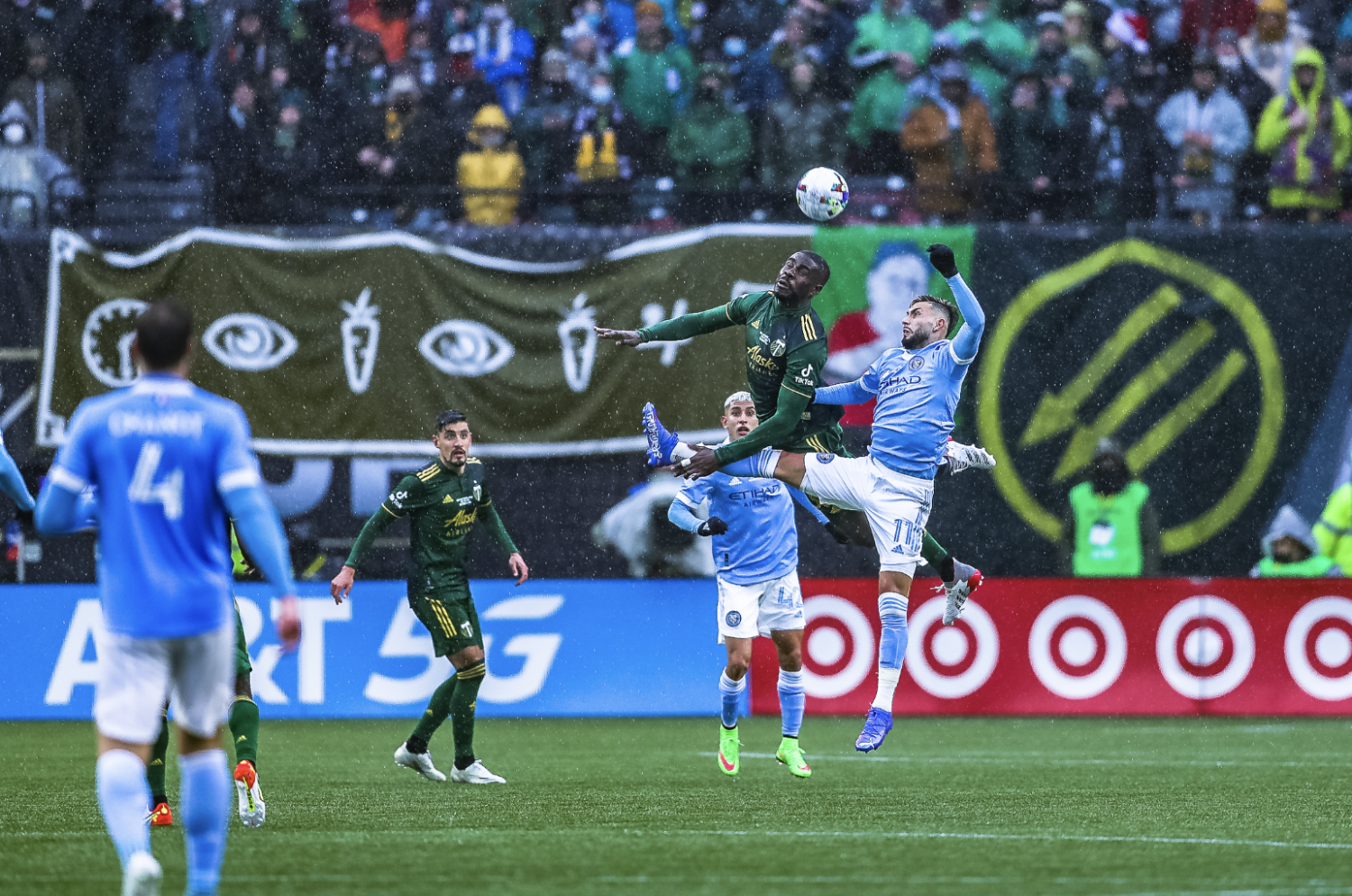
The Mabiala/Dario Zuparic tandem dug deep in the fall and winter, just as you would expect from a veteran duo, and delivered the kind of steady, locked-in defensive performances MLS Cup teams always get from their center backs. Both players had standout moments in the playoffs, and Mabiala in particular was tremendous in MLS Cup.
But now both players are hurt to start the season, with identical sports hernia injuries. They’re slated to be back in mid-March, but until then, the Timbers’ depth at this position will be tested.
Bill Tuiloma has stepped into these kinds of positions before, but it’s fair to say that 24-year-old California native Zac McGraw has not. McGraw only started two games last year—games where the Timbers shipped six goals—and it will be a big task for Tuiloma to shepherd the backline in the absence of the two starters. Rookie Justin Rasmussen, signed the day after scoring a banger against Viking FK in preseason, could get minutes as well.
In the bigger picture, there are plenty of reasons for confidence and a few for concern. Mabiala generally goes through periods where he struggles with the pace of play, and neither he nor Zuparic have the kind of speed or agility that clubs increasingly look for in center backs.
This unit has always gotten it done when it’s mattered for the Timbers in recent years, but after conceding 52 goals in 2021 with an excellent goalkeeper behind them, the margins for regular-season error may be thinner this time around. We’ll see how this group holds up.
The Timbers finally, after the beginning of preseason, hammered out a deal to bring last year’s starter, Jose Carlos Van Rankin, back for 2022.
But the structure and length of Van Rankin’s deal—a loan through the summer that the Timbers can extend through the end of the year—is not exactly a vote of confidence. Neither the Timbers nor Van Rankin’s parent club Guadalajara seem sold on the fullback, which is understandable. He was frequently caught out of position and flat-footed defensively last year.
Van Rankin’s precarious position has almost certainly opened the door for Bonilla, who, at 22, has established himself with the first team and is getting looks with the Venezuelan national team. The question for Bonilla is about maturity: in his young MLS career, he’s committed well over a foul per game, averaged a yellow card almost every three games, and was recently sent off in a preseason match. He’s a competitor, which is a good thing, but his performances for the club have been uneven.
Bonilla is six years younger than Van Rankin, considerably cheaper, and still growing as a player. If he wins the job, it’ll make the Timbers’ lives easier. If he doesn’t, Van Rankin’s loan will be extended.
Assuming Chará doesn’t fall off a cliff this year, this is a position of real strength for the Timbers.
The captain, who was the best player on the field in MLS Cup two and a half months ago, remains the premier defensive midfielder and one of the most valuable players in the entire league.
Erik Williamson, who was trending in that direction before tearing his ACL in Seattle last summer, figures to slot in next to him once fit in a season that could put him back in contention for a place in Gregg Berhalter’s World Cup squad.
The Timbers have also invested in the highly-rated young Argentinian David Ayala in this spot, who, given their depth at this position, they can afford to integrate slowly and allow to acclimate to MLS without serious pressure, just as Santiago Moreno, another young Designated Player, did last season.
Alongside that trio, Cristhian Paredes significantly raised his stock with the club during the playoff run last year and remains, when he’s locked in, an above-average MLS center mid: skillful on the ball with a good understanding of both attacking and defensive space.
George Fochive may be more of a blunt instrument, but he is now, just as he was during his first spell with the club, a reliable depth piece who can chew up minutes and provide cover for his central midfield partner as a true six.
Savarese can get three of these players into his lineup if he plays a 4-3-3, which, given the strength of the midfield, might make some amount of sense. If it’s the 4-2-3-1, however, competition for the spot next to Chará will be fierce.
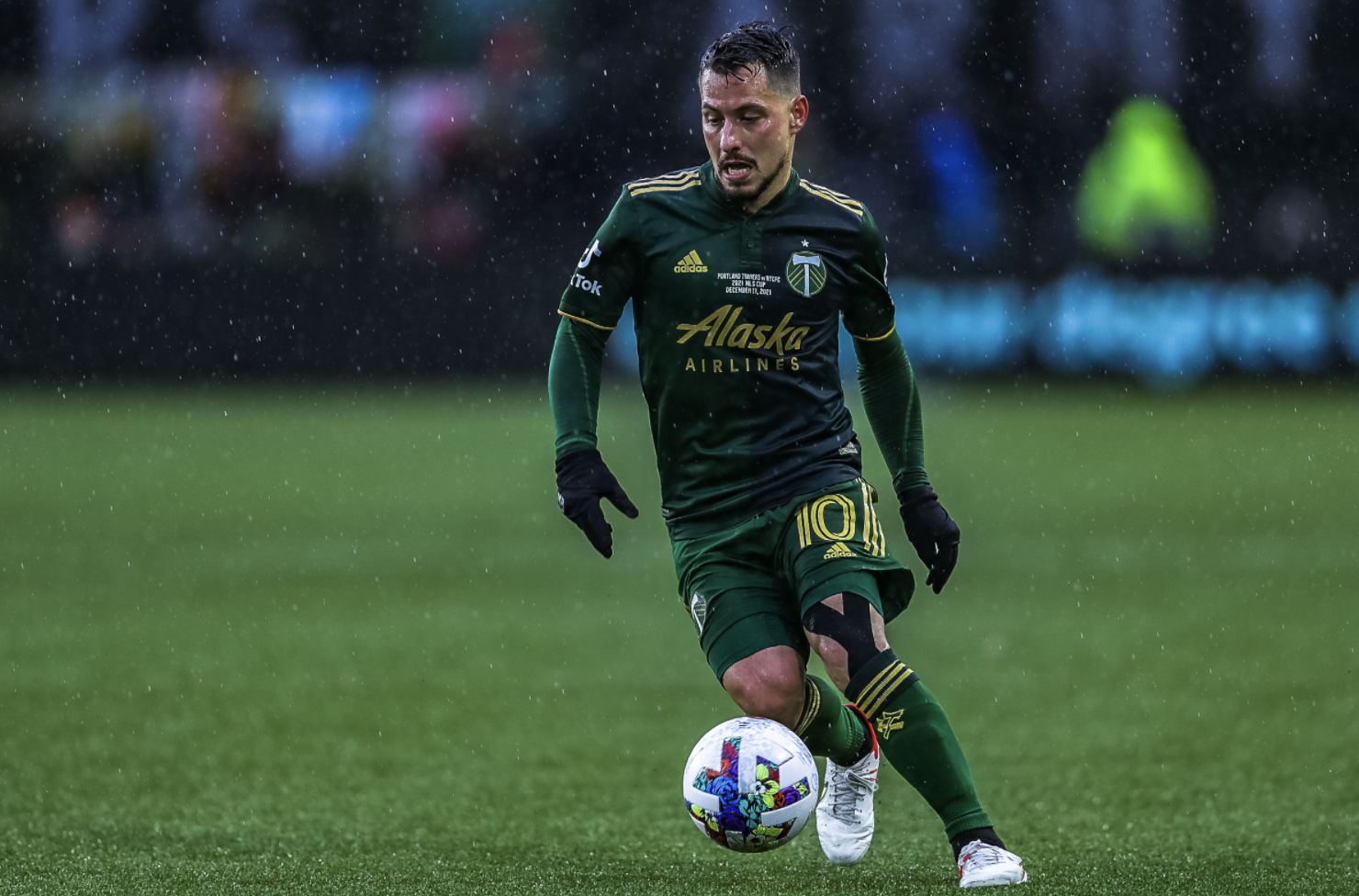
Even without a marquee singing to replace the departed Valeri, this should be another position of strength.
With Sebastian Blanco’s return, protracted as it was, the Timbers have four starting-quality attackers: Blanco, Yimmi Chara, Dairon Asprilla, and Santiago Moreno.
None are true playmakers in Valeri’s mold, and all four may be most comfortable on the wing, but their ability to interchange and complement each other gave defenders fits throughout the playoffs and should allow Savarese to throw different looks at different opponents.
Asprilla dramatically elevated his usefulness and fluidity on the ball last year, but his greatest weapon, as always, is his directness and power in the air. He’s physically a handful for defenders, especially fullbacks. Moreno’s speed makes him a handful in a very different way. He was almost unmarkable against Real Salt Lake in the Western Conference Final. Chará is, of course, a workhorse—a positive and a contributor in most every phase of the game.
With all that said: there is no minimizing Blanco’s importance. The Timbers were completely adrift without him last season, averaging 0.9 points per game in games he missed, and absolutely dominant after he returned to the lineup in the summer.
It’s not just Blanco’s attacking threat, which from just about anywhere on the field, in just about any game state, is significant. It’s also that he is very clearly this team’s alpha, a player who reliably changes the feel of games with his presence alone.
There are very few players in MLS who we can say the same of. The Timbers need him healthy, which, given that seemingly every medical team that took a look at his knees this winter raised red flags, is going to make for some very tense moments in the coming months.
Marvin Loría, who played one of the best games of his Timbers career against RSL last time he featured in a competitive match, is back as well, as is Blake Bodily. Savarese will likely find Loría minutes, while Bodily is could be in a do-or-die year if he wants to continue his MLS career.
The Timbers are in an interesting position here: they committed big money to two players, Felipe Mora and Jarosław Niezgoda, who the front office felt could be answers at center forward in a way that Jeremy Ebobisse was apparently not.
Mora will likely miss at least the first month of the season injured, giving Niezgoda, who has made just ten starts over the last two years, his very first run as the clear starting forward. There is no question that the Pole is an instinctual finisher, excellent in the box. It does remain to be seen how active he can be in other phases of play and whether he can affect games and contribute to the attack if he’s not scoring.
Mora, though he ran hot and cold last season, certainly did that. He’s possibly the most complete forward the Timbers have ever had, and even if he doesn’t take over games like Fanendo Adi or Brian Fernandez did, his 18-goals-in-35-starts strike rate speaks for itself.
If they’re healthy, these are valuable, talented players. Whether they justify their combined budget charge and elevate themselves into the league’s top striking tier very much remains to be seen.
Homegrown signing Tega Ikoba figures to make his first team debut during Mora’s absence, and, given the injury history of the two players ahead of him, the Timbers will be hoping he adjusts to life in MLS quickly.